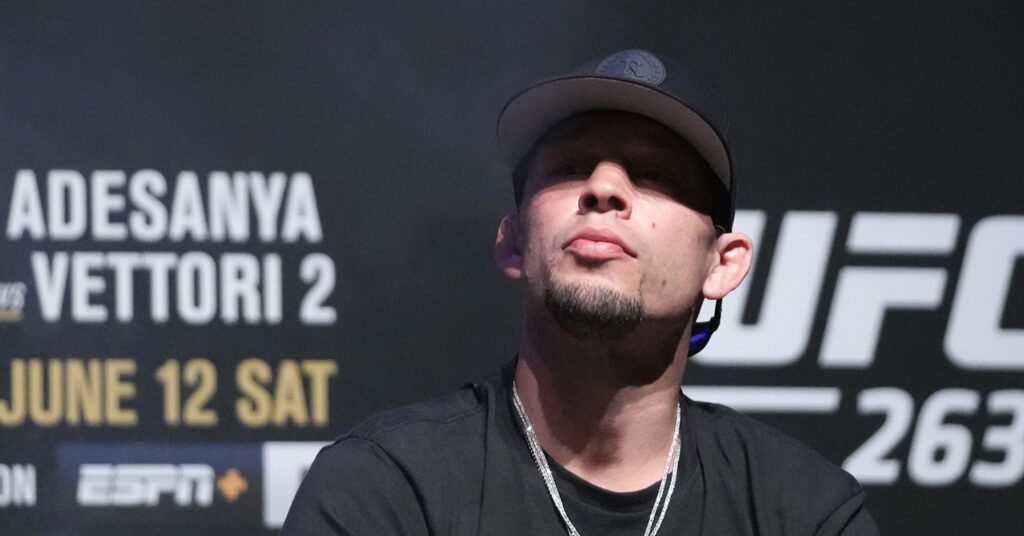Updated September 19, 2019. Nate Diaz is back after a three-year hiatus. The 34-year-old mixed martial artist made his return at UFC 241 in Anaheim, California, last month, sealing a victory over Anthony Pettis in the co-main event. Prior to his return to the Octagon, Diaz has spoken openly in interviews about training on a raw vegan diet.
The welterweight fighter was declared the victory after three rounds in five minutes against Pettis. Diaz showed no signs of ring rust with primarily quick strikes that laid the pressure on his competitor. His win was a unanimous decision from all three judges.
Diaz’s victory was widely praised by sports journalists as well as UFC president Dana White, with whom the fighter has a strained history. In 2014, White infamously said that Diaz was “not a needle mover,” criticizing him for bringing in low ratings. His tune changed following Saturday night’s match. During the post-match press conference, White was asked if Diaz was one of UFC’s biggest stars on the level of Irish-American fighter Conor McGregor, the biggest PPV (pay-per-view) star in MMA history. “Yeah…it’s pretty tough to deny,” he said. “He’s a needle mover now.”
Diaz will take on Jorge Masvidal in his next fight, which will take place at Madison Square Garden in early November.
The fight was formally announced at a recent news conference in New York. According to Yahoo Sports, a reporter at the conference “taunted” Diaz for being a vegan. This prompted the athlete to lean into the microphone and say, “The Terminator was a vegan, [expletive].”
Training on Plants
UFC was Diaz’s first return to the Octagon since his loss against McGregor at UFC 202 in 2016, which was named Fight of the Night. In an interview with UFC Ultimate Insider host Megan Olivi ahead of the match, the 170-pound fighter spoke about his diet. Diaz adopted a plant-based diet at age 18. When asked if he was still vegan, he replied that he occasionally eats eggs and fish, but follows a raw vegan diet when training for fights.
Diaz explained that after fights, he would try to eat meat and dairy again, but it wouldn’t sit well with his body. “I don’t need this in my life,” he said. “I don’t crave for it or nothing. I haven’t since I was 18-years-old.”
His brother, former UFC figher Nick Diaz — who is widely considered to be a pioneer of the sport — was the one who turned him onto his health-conscious lifestyle.
Diaz would cut out all animal products to make weight before the fight, but his brother Nick’s motivation was purely health-related. Diaz followed in Nick’s lead, inspired by his track record for winning matches.
Meat has long been synonymous with masculinity — and “Got Milk?” advertisements of the 90s featuring top athletes tied dairy to optimal performance. Many athletes in recent years have proven that it’s all in the marketing. Several of the LA Dodgers cut out dairy and experienced faster recovery times and no inflammation.
Five-time Formula 1 racing champion Lewis Hamilton adopted a vegan diet and experienced better sleep — and he had no issue with putting on muscle when the weight limits changed. Even Arnold Schwarzenegger has spoken out against the myth of manliness and meat. He and Hamilton both joined on as executive producers of filmmaker James Cameron’s (“Titanic,” “Avatar) upcoming documentary about meat-free athletes, “The Game Changers.”
Diaz has advocated for the health benefits of a plant-based diet for athletes, but his thoughts on tofu in a 2017 episode of the Out of the Box podcast were misinformed. Diaz claimed that tofu lowers testosterone, but research has shown that that’s another myth: research shows that soy intake does not lower testosterone and may even help lower cholesterol levels.


